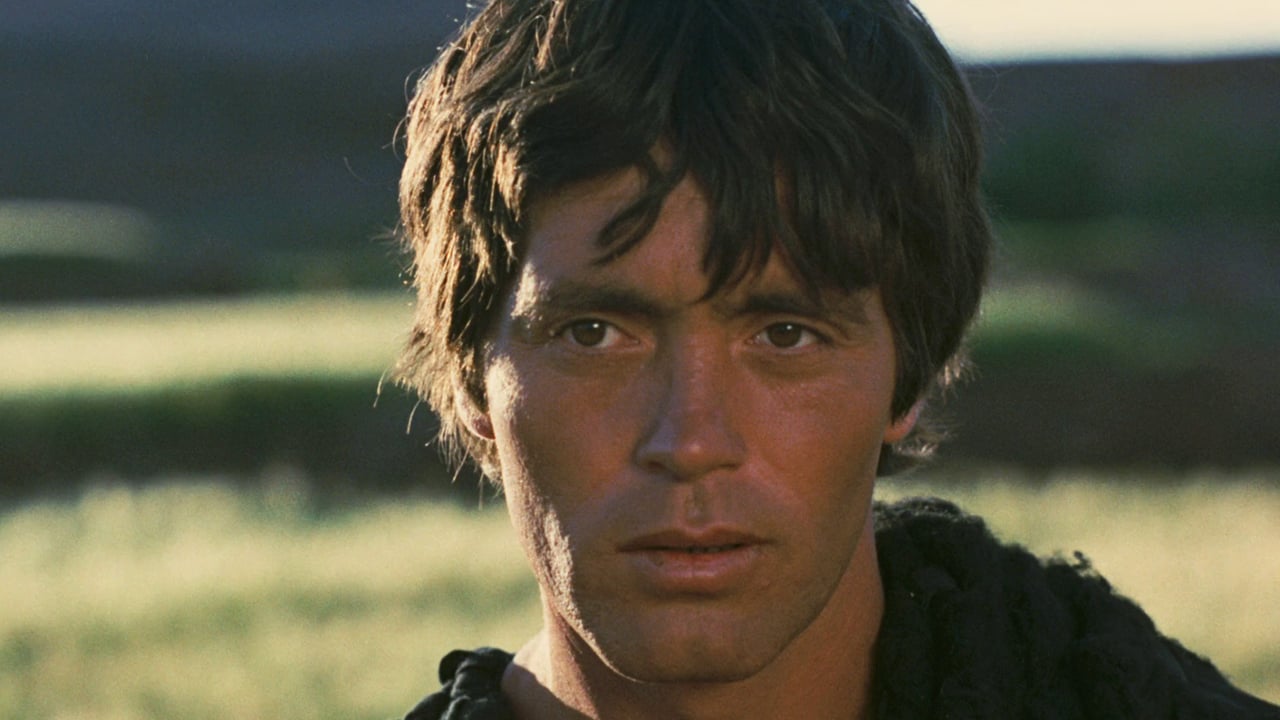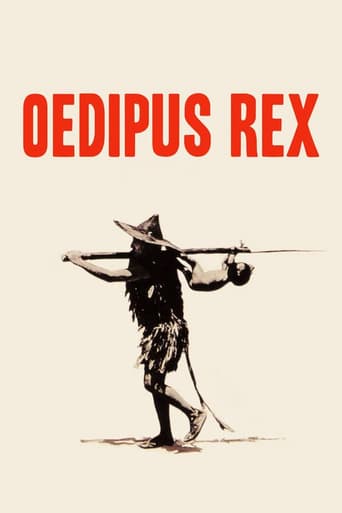



The greatest movie ever made..!
Brilliant and touching
It is both painfully honest and laugh-out-loud funny at the same time.
View MoreClose shines in drama with strong language, adult themes.
View MoreLike in other Pasolini movies, we have here two parallel told stories: There is a first "Oedipus", in the 20ies of the 20th century, a baby is nursed by his beautiful mother, sitting on a meadow. His father is afraid that the baby will steal his love. Then there is the second "Oedipus", based on Sophocles, but very freely interpreted by Pasolini, both what concerns the landscape (Southern Italy, Maroque) and the costumes, as well as the original texts (Pasolini shows parts of "Oedipus on Kolonos"). Otherwise, we are told here the mystic story of Oedipus, who is left by his parents, grows up with the king of Korinthos, gets to kill his father and to marry his mother, being fully unaware of what he is doing: he is doomed. At the end, the first Oedipus is coming back: As a blind beggar (the mystic Oedipus was blinded on his own wish) he sits in front of the cathedral of Bologna, is accompanied by a young boy and seeks that meadow where the movie started."Edipo Re" (1967) is one of those films by P.P. Pasolin about which we have extensive comments by the author and film director. Pasolini considered this film autobiographic, being himself that baby on that meadow suckling the milk from his beautiful mother's breast and causing unintentionally his fascist-fathers hatred. He made himself responsible for the death of him whom he loved and hated at the same time. Also, in this picture, there is the complicated relationship of the gay-man towards his mother which Pasolini called "latent". Pasolini wrote that he intended a completely metaphorical and mysticized autobiography, but instead of projecting the myth onto psychoanalysis, he would project psychoanalysis on the myth. So, there is only to say that we know Pasolini's mother Susanna from several of her son's movies in which she played minor, but often crucial roles - in the "Gospel according to St. Matthew" she was the old Marie ... .
View MorePasolini's Oedipus Rex is a crazy, brutish parade of primitivism, psychosis and weird head-gear - the play as Sophocles himself might've mounted it were he under the influence of some strong hallucinogen. This is one of Pasolini's favorite pastimes, the staging of old literary works as nut-job pageants suffused with a genuine feel for the random craziness of ritual, the sense of people adorning themselves in keeping with impenetrably bizarre superstitious imperatives. The array of outlandish head-wear in this movie would be enough for a museum - three-foot-tall cylindrical gold crowns; helmets composed of curved iron segments dangling from the brim of a saucer-shaped hat; garlands of woven straw worn not horizontally around the skull but vertically ringing the face. Even the Oracle of Delphi gets in on the act, sporting a tall snow-man-shaped pottery-mask-looking contraption with a sprig of vegetation sticking out the top. It's as if ancient life were nothing but one big act of head-wear oneupmanship.The play survives intact despite Pasolini's odd-ball preoccupations. The director's favorite Cro-Magnon thespian, Franco Citti, portrays the hapless Oedipus, while the formidable Silvana Mangano tackles the role of Jocasta, Oedy's self-absorbed mother/wife. The melodrama plays out with all its earth-shaking inevitability, following Oedipus from foundling to patricidal loon to incestuous king to blind wandering fool; Pasolini staging the action so bluntly, so rawly, that we could be watching an ancient performance captured by curious aliens with movie-cameras. The acting as usual is variable. Citti, a physically striking if technically inept actor, creates an Oedipus who seems completely free of snappy psychological accoutrement - an Oedipus who is, quite literally, an over-grown child. As Jocasta, Mangano displays the kind of subtle technical command that Citti utterly lacks, but doesn't have enough scenes to really bring forth a character (Pasolini uses her mostly as an embodiment of overwhelming feminine presence, much as he did Maria Callas in Medea, the companion-piece to Oedipus). There's very little that's subtle about the way Pasolini attacks the central psychological issues of Oedipus, the stuff that has made for one psychiatric treatise after another since the days of Freud. The emotions are splashed all over the screen in typically unrestrained Pasolini fashion. Oedipus is a ranting lunatic; the scene where he kills his father, Laius the King of Thebes, is a homicidal tantrum to make Travis Bickle blush. Citti is not a commanding enough actor to give his scenes any real melodramatic weight, but this doesn't matter given that Pasolini is less interested in melodrama than he is in conveying the idea of psychosis as a kind of universal human condition. This is not Oedipus the grand tragic figure, this is Oedipus the psychopath. There is little in this character that could be described as redeeming - he's a cowardly, childish, mindlessly violent hypocrite. He wears a false beard to show that he's a false king, and after he blinds himself, so he will no longer have to look upon the horrors he himself has been guilty of unleashing, Pasolini transports him to the modern world for a sort of ironic coda that, like the central juxtaposition in his semi-masterpiece Porcile, makes explicit his point about modern humanity's inability to escape its own primal urges.This isn't Intro to Greek Literature Sophocles, it's a mining of Sophocles for the kind of brutishness that turns Pasolini's crank. The question one must ask again is, How the hell does Pasolini get away with it? Why does the kind of material that would seem the stuff of exploitation and rank tastelessness in another director's hand become, in Pasolini's, the stuff of primitive/modern art? There's nothing particularly beautiful in the images, except for the savage beauty of the prehistoric settings. There's almost none of that high-culture flush that symbolists like Fellini and Bergman were able to give their film-buff-coddling "masterpieces." The secret must be in Pasolini's straight-forwardness, his complete lack of moral pretense. He's one of the few directors I can think of who could get away with turning Oedipus into an example of humanity's inherently psychotic nature and still not come across like a high-minded putz. He tears Oedipus Rex down from the realm of stodgy high-culture and re-envisions it as a cry of psychopathic rage, set in a world as inscrutable as the mind.
View MoreWe do ourselves no favour by fixating on how well a film uses every little detail and line in an original text. Certainly, by those standards this is a mediocre, and possibly lazy, film at best. But at the same time there is the problem of being so liberal in one's adaptation that every goes sour, the latest attempt at "Vanity Fair" is a perfect example. But this film, along with Bresson's "Pickpocket," should stand as the rules of adaptation for every young director. Both films are very interpretative, but the directors aren't so naive as to think that mere plot details can constitute a film. So what pushes this film beyond a mere surface-level adaptation? In this case, it takes a deep insight into the nature of Greek tragedy itself. Tragedy's dualism (the representational and the chaotic) is prevalent in all Pasolini's works, it was especially essential in his "Gospel," and I was excited to see how it played out in its own source, and the results are absolutely fantastic. Visually imaginative and so intellectually superior to its contemporaries it seems out of place in film.5 out of 5 - Essential
View MoreSophocles' Oedipus Rex is adapted well for the foreign screen. Pasolini, better known for the controversial Salo; 120 Days of Sodom, has kept the intensity level to a minimum while still presenting the perverse qualities for which he would be known for. If you don't know the story (like who doesn't) read the play before seeing the movie - there tends to be a shortage on literature freaks these days. Beautifully filmed, Oedipus Rex begins in modern times, continues sometime BC, and finally ends back in the 20th century; thus presenting a sociological thesis for the viewer. The acting is a bit hammy (seeing Oedipus with a mad streak can be over the top) although the characters are developed well and recite their lines as if on stage. My only complaint is the subtitles seem to blend in with the scenery --- white subtitles against a white background. Therefore, this flaw makes it difficult to enjoy some scenes, and Pasolini's poetry is usually superb. Nevertheless, it's still a great film and is worth a look, especially by people with preconceived hatred for Pasolini's later work -and there's definitely a lot out there.
View More